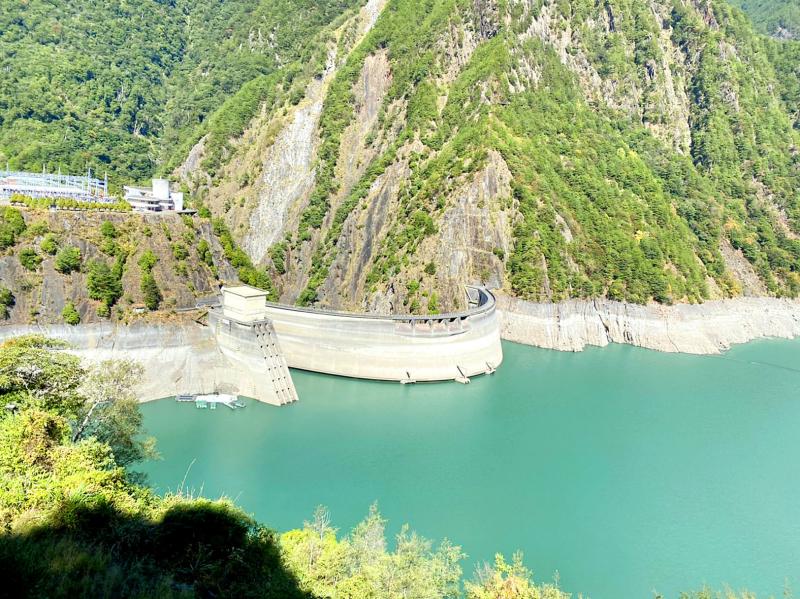Local irrigation agencies plan to turn to sea goddess Matsu (媽祖) for help resolving a drought, in a collaboration with one of Taiwan’s largest Matsu temples, Jenn Lann Temple in Taichung’s Dajia District (大甲), the Council of Agriculture’s Irrigation Agency said yesterday.
The temple is to hold a ceremony with the agencies today, and Matsu would hopefully hear people’s prayers for rain, as many believe that she has the ability to send rain after long droughts, the temple said.
The ceremony, for which the temple requires participants to wear white clothes, is to run from 9am to 11am, it said.

Photo: Chang Hsuan–che, Taipei Times
More than 2,000 people had as of yesterday signed up for the ceremony, it said, adding that among the participants would be many farmers who are waiting for the rainy season to start so that they can start planting.
The drought was in part due to no typhoons hitting Taiwan last year, the first time since 1964, the temple said.
The ceremony would only be the fourth rain prayer ceremony held at the temple since its founding in 1730, it said.
The first ceremony was held during the Qing Dynasty, the second during the Japanese colonial period and the third in 1963, the temple added.
About one hour after the 1963 ceremony, rain started to fall, and it is hopeful that Matsu would also help reserve this year’s drought, it said.
However, temple chairman Yen Ching-piao (顏清標) said that he was not sure whether the ceremony would lead to the timely onset of seasonal rain. Minister of Economic Affairs Wang Mei-hua (王美花) said that the ceremony was aimed to comfort the public.
The Ministry of Economic Affairs would continue to coordinate water supply for farmers and science parks, which have been the top water users.
Since last year, Taiwan has been facing a serious water shortage, particularly in Miaoli County, Taichung and Hsinchu City, Water Resources Agency data showed.
Water levels in many reservoirs in central and southern Taiwan have dropped to below 20 percent of capacity, the data showed.
Matsu, also known as Tian Hou (天后, Queen of Heaven), is a deity who has been worshiped since at least the 12th century. Originally from southeastern China’s Fujian Province, she was a Fujianese shamaness believed to have divine powers to protect fishers and seafarers.
Over the centuries, Matsu worship spread throughout China’s coastal regions and to Chinese-speaking communities in Southeast Asia. The belief in Matsu as benevolent protector of all people was brought to Taiwan by Ming Dynasty settlers.

A decision to describe a Chinese Ministry of Foreign Affairs statement on Singapore’s Taiwan policy as “erroneous” was made because the city-state has its own “one China policy” and has not followed Beijing’s “one China principle,” Deputy Minister of Foreign Affairs Tien Chung-kwang (田中光) said yesterday. It has been a longstanding practice for the People’s Republic of China (PRC) to speak on other countries’ behalf concerning Taiwan, Tien said. The latest example was a statement issued by the PRC after a meeting between Singaporean Prime Minister Lawrence Wong (黃循財) and Chinese President Xi Jinping (習近平) on the sidelines of the APEC summit

Taiwan’s passport ranked 34th in the world, with access to 141 visa-free destinations, according to the latest update to the Henley Passport Index released today. The index put together by Henley & Partners ranks 199 passports globally based on the number of destinations holders can access without a visa out of 227, and is updated monthly. The 141 visa-free destinations for Taiwanese passport holders are a slight decrease from last year, when holders had access to 145 destinations. Botswana and Columbia are among the countries that have recently ended visa-free status for Taiwanese after “bowing to pressure from the Chinese government,” the Ministry

HEALTHCARE: Following a 2022 Constitutional Court ruling, Taiwanese traveling overseas for six months would no longer be able to suspend their insurance Measures allowing people to suspend National Health Insurance (NHI) services if they plan to leave the country for six months would be abolished starting Dec. 23, NHIA Director-General Shih Chung-liang (石崇良) said yesterday. The decision followed the Constitutional Court’s ruling in 2022 that the regulation was unconstitutional and that it would invalidate the regulation automatically unless the NHIA amended it to conform with the Constitution. The agency would amend the regulations to remove the articles and sections that allow the suspension of NHI services, and also introduce provisional clauses for those who suspended their NHI services before Dec. 23, Shih said. According to

Minister of Labor Ho Pei-shan (何佩珊) yesterday apologized after the suicide of a civil servant earlier this month and announced that a supervisor accused of workplace bullying would be demoted. On Nov. 4, a 39-year-old information analyst at the Workforce Development Agency’s (WDA) northern branch, which covers greater Taipei and Keelung, as well as Yilan, Lienchiang and Kinmen counties, was found dead in their office. WDA northern branch director Hsieh Yi-jung (謝宜容), who has been accused of involvement in workplace bullying, would be demoted to a nonsupervisory position, Ho told a news conference in Taipei. WDA Director-General Tsai Meng-liang (蔡孟良) said he would